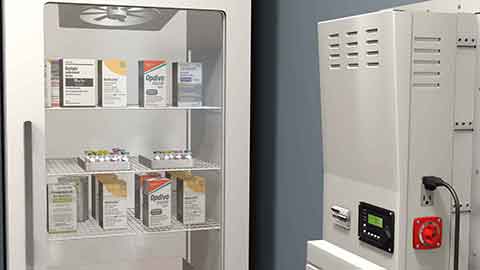Best Practices and Guidelines for Rheumatology Medication Storage
As healthcare providers, it is our responsibility to ensure the safe and effective storage of rheumatology medications for patients with chronic inflammatory conditions. Proper medication storage is essential to maintain the drugs' potency and integrity, which directly impacts patient outcomes. In this blog, we will discuss the best practices and guidelines for rheumatology medication storage, emphasizing the importance of maintaining the right temperature, protecting against light and humidity, organizing storage, and implementing secure access measures. Additionally, we will explore the role of battery backup power in safeguarding medications during power outages or natural calamities.
1. Temperature Control and Monitoring
Temperature control is crucial in preserving the efficacy of rheumatology medications. Many of these drugs, such as biologics and DMARDs, are sensitive to temperature fluctuations. It is essential to store them within the recommended temperature range to ensure their therapeutic effectiveness. Utilize pharmaceutical-grade refrigerators with precise temperature controls to store refrigerated medications safely. Regularly monitor the temperature and keep records to identify any deviations promptly.
2. Light Exposure
Light exposure can degrade certain rheumatology medications, leading to reduced efficacy. To prevent this, store medications in opaque or dark-colored containers. Avoid placing medications in areas with direct sunlight or excessive artificial light. Protecting drugs from light ensures their stability and maintains their pharmacological properties.
3. Humidity Control
Maintaining proper humidity levels is equally vital for preserving medication efficacy. High humidity can promote drug degradation and compromise the integrity of rheumatology medications. Store medications in dry areas and consider using desiccant packs to absorb excess moisture. This precaution will help ensure the medications remain in optimal condition throughout their shelf life.
4. Organized and Segregated Storage
Organizing and segregating medication storage is crucial to prevent errors and cross-contamination. Label all medications clearly with their name, strength, and expiration date. Implement a rotation system to use older medications first, reducing the risk of using expired drugs accidentally. Separate medications based on their specific storage requirements, such as refrigerated and non-refrigerated drugs.
5. Security and Access Control
Maintaining secure access to medication storage areas is vital to prevent unauthorized access and potential tampering. Limit access to authorized personnel only and ensure medications are stored in locked cabinets or rooms. By implementing secure access measures, healthcare providers can safeguard medications from theft and protect patient safety.
6. Battery Backup Power
In the event of power outages or natural calamities, battery backup power plays a crucial role in preserving the integrity of rheumatology medications. A reliable battery backup system ensures uninterrupted power supply to refrigerators and temperature-controlled storage units, even during emergencies. This prevents temperature fluctuations that could otherwise compromise the potency of sensitive medications. Integrating battery backup power into medication storage facilities enhances disaster preparedness and reinforces the commitment to patient care and safety.
Conclusion
Proper storage of rheumatology medications is essential for maintaining their efficacy and ensuring patient safety. By adhering to the best practices and guidelines discussed in this blog, healthcare providers can optimize patient outcomes, reduce medication waste, and minimize the risks associated with improper storage. Regular temperature monitoring, protection against light and humidity, organized storage, secure access measures, and the implementation of battery backup power are key elements of an effective medication storage strategy. By prioritizing these practices, doctors can instill confidence in their patients, enhance treatment outcomes, and demonstrate their dedication to delivering the highest standard of care in rheumatology management.



